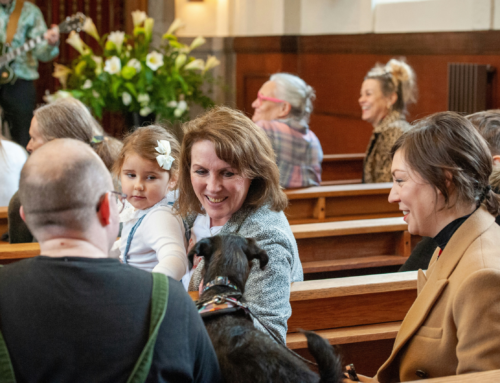Guest Post by Matthew Arguin, Assistant Curate-Coordinator of Outreach and Evangelism at Bishop Cronyn Memorial Church, Diocese of Huron, Anglican Church of Canada. This post was originally the content of a sermon Matthew delivered on August 25, 2013.
Old Testament: Jeremiah 1:4-10
New Testament: Luke 13:10-17
Now the word of the Lord came to me saying,
‘Before I formed you in the womb I knew you,
and before you were born I consecrated you;
I appointed you a prophet to the nations.’
Then I said, ‘Ah, Lord God! Truly I do not know how to speak, for I am only a boy.’ But the Lord said to me,
‘Do not say, “I am only a boy”;
for you shall go to all to whom I send you,
and you shall speak whatever I command you.
Do not be afraid of them,
for I am with you to deliver you,
says the Lord.’
Then the Lord put out his hand and touched my mouth; and the Lord said to me,
‘Now I have put my words in your mouth.
See, today I appoint you over nations and over kingdoms,
to pluck up and to pull down,
to destroy and to overthrow,
to build and to plant.’
Touch the words of my tongue O Lord, so that only the truth may be spoken, and only the Truth heard.

In case you didn’t know, I’m a huge nerd. This year instead of “relaxing” on the first week of my vacation, I decided to attend a conference in Toronto.
It was a wonderful event with about 100 people from many diverse backgrounds; clergy, occupational therapists. Nurses. Social workers, students etc. and just people who were interested in the subject of disability and how it might fit with theology.
It was an intense week with three speakers plus workshops for 5 days, but it was a very fruitful conference. Where I ‘geeked out’ the most, though, was the general concept that Disability and Theology was a THING! I had read and thought about it in seminary, of course, but had no idea that other people were interested in it too!
There was a group of about 40 Canadians—give or take—and a bunch of folks were from the States; Mostly working professionally with PWD or studying their MA/PhD.
It was awesome to see so many people, share so many different perspective, and to have people come together and share their stories.
One of the greatest things that I came away with – or, I should say, was reminded of – was the power of the story. Here people were being open, honest and candid about disability; how it affected their lives (positively or negatively) and sharing part of who they are.
This connects a lot with our reading from Jeremiah—which I’ll get to in a second—but first let’s take a look at the Gospel.
 As you can imagine, stories like this one from Luke 13 about Jesus healing a disabled woman on the Sabbath came up at the conference. These stories of healing are spread throughout the Gospels. Is ‘healing’ the same as being ‘cured’? What does it mean to be afflicted with demons? Why are these stories included at all?
As you can imagine, stories like this one from Luke 13 about Jesus healing a disabled woman on the Sabbath came up at the conference. These stories of healing are spread throughout the Gospels. Is ‘healing’ the same as being ‘cured’? What does it mean to be afflicted with demons? Why are these stories included at all?
This woman is afflicted by a demon of 18 years; and is crippled by it. So much so that she is doubled over in pain and distress.
It’s never specified whether the demon has any other effects; whether a mental illness or some physical manifestation of some biological process. Only that she is deeply affected by it.
In Luke’s gospel, the healing narratives serve a very concrete purpose; to show that Jesus has power and authority from God. He is the only gospel writer to explicitly use the language of “Lord” in the text to refer to Christ.
The purpose of the healing stories is not so much the act itself—though that is certainly part of it—but rather it is to emphasize that Jesus is Lord.
That He indeed comes with Grace, love and abundance. That he is here to offer these gifts freely.
But the really interesting part for me is Jesus’ response. Did you notice how he addresses the woman?
Of course, no one is supposed to heal on the Sabbath. And yet, Jesus breaks the rules; he heals her anyway. God’s grace and mercy shine through regardless of the rules.
More than that, Jesus calls the woman a child of God.
Someone who is shunned by the community is given a name and claimed as God’s own, with a recognition that she too is part of the community! This was the way she had been formed from the womb.
Just like Jeremiah’s call to prophecy, we are each blessed with our own gifts and talents given to us from the hand of Love itself. He who knew and shaped us from the dawn of our lives knows intimately who we are… disabilities and all.
The last thing that a preacher wants to do is make a sermon all about me… but I want to share part of my story with you, because I believe there is power in stories….and also it will hopefully act as an invitation for each community to share their stories too.
One of the most fruitful parts of the conference was the idea that my cerebral palsy is a gift. Even as a 31 year old male, there are plenty of times when it doesn’t feel like a gift at all. And I was sort of in that kind of crisis when I arrived here at St. Jude’s.
Some of you know parts of the story, but I had a full-fledged meltdown in 2nd year seminary.
I was doing my placement and just realized I couldn’t handle all the craziness that was coming with ministry. It got to the point where I had to decide between going to work, or going home and having a shower for my own health and well being… You see, I need help from a PSW to do that.
I broke down in front of my supervisor and said that something had to give. At that point, he said “OK, you need to take a break from here… find another community and take care of what you need.”
Between the two of us and Phil [rector of St. Jude], we decided that St. Jude’s was a good fit. And so I came here. We also decided that starting in the Fall term, I would switch from doing parish ministry to chaplaincy work at Kensington Village retirement home.
Over the course of working with folks at Kensignton, I realized that being in a wheelchair was actually awesome for the job. The fact that residents met with someone who also struggled with mobility and support issues, opened whole new avenues of conversation and ministry as they embraced the new realities of aging.
Lo and behold! The CP which I found so annoying and frustrating ended up becoming a gift to the Church.
 I bring this up – again, not to make it all about me – but to underscore that we are all awesomely gifted. Awesome because of the way in which we are all individually formed by God…..who knew us before we before we were born, and spoke us lovingly into being.
I bring this up – again, not to make it all about me – but to underscore that we are all awesomely gifted. Awesome because of the way in which we are all individually formed by God…..who knew us before we before we were born, and spoke us lovingly into being.
Our very selves is the gift we bring to the Church.
We all have parts of ourselves that we consider less than desirable, those aspects of ourselves that double us over in stress, anxiety, pain. Whether it’s CP, someone on the autism spectrum, or the fact that we wish we could do something better or differently – those very things are a part of who we are.
Far from being the things that hold us back, they can actually end up being the source of blessing for others!
Each one of you here has gifts and talents. Each one of you is unique. Each one of you has a story. Each one of you God knows intimately, loves intimately, even before you were born.
Some of the most powerful moments I have witnessed came in the first year or so that I was here.
During that time, the St. Jude’s community was going through a visioning process. At the end of each service for about 5 weeks someone from the congregation would get up and share their faith story; how they found St. Jude’s, why they stayed; why this community matters.
I would suggest as we go forward into the Fall program year, we give some serious thought to being that open and vulnerable again. To share our stories. To speak them out loud to one another.
While all of you may not be comfortable sitting up here and preaching a sermon, I know ALL of you are capable of preaching the Gospel… just by being who you are and sharing yourself with the world!
Because your stories have POWER. And speak to the Mercy, Grace, and abundant Love that God gifted to the world in creating you, forming you just as you are. Calling you just as you are.
That’s why I stand before you today with no vestments on. Just a sweater and track pants. God calls us as we are. Whether lay or ordained, or whatever! God wants us to just BE who we are; wondrously made and beautiful!
There are times when we struggle to see ourselves that way. If I looked through the lens of the medical model, my disability is simply a mistake the doctors didn’t catch. The umbilical cord wrapped around my neck, causing lack of oxygen to the brain. As a result, the messages from my brain don’t travel to my muscles properly, and my muscles tense up. That’s why you often see my legs splayed out like this when I speak. It’s annoying and often creates some frustrating—and often hilarious—moments.
But switch the lens. All of a sudden, when we look at CP from a faith perspective, it becomes a gift.
It can be scary to share our stories. Especially those parts which we think are deficient, annoying, stupid, painful etc. But those very things we see as flaws can end up being the very thing that changes the world; that allows us to live out and build up the kingdom.
I know each of you has amazing gifts and talents to share with the world.
I thank God for who you are, who God has formed you to be, and for everything you offer. Thanks be to God!
Amen.
You can find out more about Matthew and his journey by watching the following YouTube video. Note that since the time of this video Matthew has been ordained as a priest.


